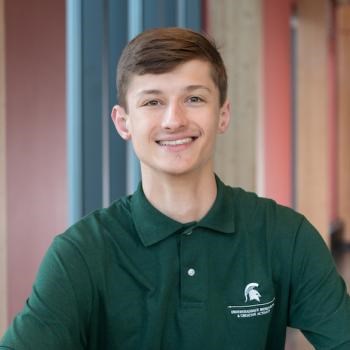2025 Annual Initiation Ceremony
2025 Annual Initiation Ceremony
Michigan State University's Chapter 041 Annual Initiation and Awards Ceremony was held on Saturday, April 5, 2025. The event marked the Chapter's 98th year at MSU, and featured a reception, annual induction ceremony, presentation of several awards and distinctions, and talks by special guests. A total of 89 new members were initiated.
This year's invited speaker was:
 Megan K. Halpern, founding director of the Michigan State University Center for Interdisciplinary Research, Collaboration, Learning, and Engagement – or CIRCLE. She is also an Associate Professor of Science and Society with Lyman Briggs College, where she also currently serves as a Leadership Fellow in Faculty Affairs.
Megan K. Halpern, founding director of the Michigan State University Center for Interdisciplinary Research, Collaboration, Learning, and Engagement – or CIRCLE. She is also an Associate Professor of Science and Society with Lyman Briggs College, where she also currently serves as a Leadership Fellow in Faculty Affairs.
Megan Halpern attended Smith College, graduating with a bachelor’s degree in Studio Art in 1997. After college, she worked as a freelance set designer and scenic artist in New York City. In 1999, she co-founded Redshift Productions to create performances inspired by science, and in collaboration with scientists. With Redshift collaborator Max Evjen, Megan wrote and directed Elements at New York’s HERE Arts Center in 2000. Combining live music and dance in an exploration of Aristotle’s four elements: air, water, fire, and earth - Elements captured the attention of no less a notable a scientist than Astrophysicist Neil De Grasse Tyson, who wrote about the performance in both Natural History Magazine and in his forward to Lynn Gamwell’s book, Exploring the Invisible: Art, Science and the Spiritual. On September 17th, 2003, just days before the Galileo Orbiter completed its fourteen-year mission and plunged into the planet Jupiter, Redshift Productions’ premiered its album Galileo: The Emotional Life of a Spacecraft, which captured the attention of mainstream media outlets, including CBS Sunday Morning and ABC’s Nightline. Redshift also created The Collaboratorium, a workshop for the development and implementation of a new structure for artist/scientist collaboration that brought together 15 artists, scientists, and audience members to discuss and engage in collaboration, when it was first held in 2003.
Her experience facilitating art-science collaborations with Redshift inspired her to pursue advanced study at Cornell University, where she earned a Master of Science degree in 2009 and her Ph.D in Science Communication in 2014.
After graduating, Dr. Halpern began a postdoctoral research fellowship at Arizona State University’s Center for Nanotechnology and Society and Center for Science and the Imagination, where she began to develop Future Design Studio, a speculative design and improvisation workshop on the politics of artifacts. She joined the faculty of Lyman Briggs College at MSU in 2015.
Dr. Halpern’s research and teaching interests include art-science studies, interdisciplinary collaboration, public engagement with science, and feminist approaches to science communication. She draws heavily on arts and design methodologies in her research, teaching, and practice. She is co-editor of the Handbook of Art, Science, and Technology Studies, published by Routledge in 2021, which launched a new field of study focusing on the intersection of art, science, and technology. She is also known for her work on the experience model of science communication.
New Initiates
In accordance with national standards for membership in Phi Kappa Phi, student candidates must have completed 24 semester hours, or the equivalent, at Michigan State University. Students are selected from the upper 10% of the senior class; the upper 7.5% of students with junior standing upon completion of 72 hours; and graduate or professional students who rank in the upper 10% of all enrolled graduate students at Michigan State University.
In addition to students, the Chapter is permitted to elect annually a small number of outstanding faculty, professional staff, and alumni chosen on the basis of academic record, professional achievements, and service to higher education. These persons are nominated by chapter members and, as with the student candidates, are discussed and voted on by the members. The Chapter is also permitted to nominate persons for distinguished and honorary memberships. These prestigious distinctions require the review and approval of the Society's national Board of Directors.
View List of 2025 Student Initiates
View Gallery of 2025 New Initiates (Thumbnail images will open up into high resolution images for download)
2025 Excellence Award in Interdisciplinary Scholarship Recipient
Excellence in interdisciplinary research, instruction, or the application of such knowledge to problems and opportunities in society, is more difficult to perform and less frequently recognized and rewarded, than is excellence in the more traditional disciplines.
Yet many of the most intractable problems of society and the academy demand the insights and innovations only made possible by weaving together the very best thinking and work from across several domains of knowledge. The MSU Chapter's “Excellence Award in Interdisciplinary Scholarship” recognizes the outstanding interdisciplinary work of scholarly teams, in teaching, research, service, or a combination of these activities. This year’s award recognizes the MSU Telehealth Research Group.
- Sabrina Ford, Ph.D., LCP, Associate Professor, Department of Obstetrics, Gynecology and Reproductive Biology, and Director, Health Quality and Equity, Institute for Health Policy, College of Human Medicine
- Kelly Hirko, Ph.D., M.P.H., Assistant Professor, Department of Epidemiology and Biostatistics, College of Human Medicine, Traverse City Campus
- Bree Holtz, Ph.D., Associate Professor, Department of Advertising and Public Relations, College of Communication Arts and Sciences
2025 Phi Kappa Phi National Graduate Fellowship Nominee
Every year, the Honor Society of Phi Kappa Phi awards fifty Fellowships of $8,500 each, six at $20,000 each, and two at $35,000 each to members entering the first year of graduate or professional study. Each Phi Kappa Phi chapter may select one candidate from among its local applicants to compete for the Society-wide awards.
 Grant Bruninga is a senior with the Michigan State University College of Natural Science majoring in Zoology and Integrative Biology, with a minor in Environmental and Sustainability Studies. As a professorial research assistant, Grant has coupled a lifelong passion for fish and wildlife conservation with his interests in genetics and environmental policy. This coupling has been nurtured through research projects, including his most recent work, in which he has studied the genomic basis for climate change adaptation in Lake Superior Brook Trout and Lake Trout. During his college years, Grant has also served as a Conservation Science Fellow with the San Diego Zoo Wildlife Alliance, studying California mountain lions, and has participated in field research through a wildlife conservation study abroad program in South Africa. Through coursework and experiential learning, he has acquired critical research skills in such areas as: DNA meta-barcoding, Sanger sequencing, DNA extraction, gel electro-phoresis, and microsatellite analysis.
Grant Bruninga is a senior with the Michigan State University College of Natural Science majoring in Zoology and Integrative Biology, with a minor in Environmental and Sustainability Studies. As a professorial research assistant, Grant has coupled a lifelong passion for fish and wildlife conservation with his interests in genetics and environmental policy. This coupling has been nurtured through research projects, including his most recent work, in which he has studied the genomic basis for climate change adaptation in Lake Superior Brook Trout and Lake Trout. During his college years, Grant has also served as a Conservation Science Fellow with the San Diego Zoo Wildlife Alliance, studying California mountain lions, and has participated in field research through a wildlife conservation study abroad program in South Africa. Through coursework and experiential learning, he has acquired critical research skills in such areas as: DNA meta-barcoding, Sanger sequencing, DNA extraction, gel electro-phoresis, and microsatellite analysis.
Outside of the classroom and lab, Grant serves as an undergraduate research ambassador and volunteers with the Honors College’s H-STAR program, which helps recruit high-achieving high school students to attend MSU and take advantage of its many opportunities to engage in research during college.
Grant plans to continue studying Conservation Genetics in graduate school and is currently deciding between master’s degree programs in Ecology at either the University of California ‒ Davis, the University of British Columbia, or Illinois State University. In the long term, Grant hopes to become a university professor and lead interdisciplinary research that combines conservation science with community-based policy, in order to protect global ecosystems from the ongoing threats of climate change and habitat degradation.
